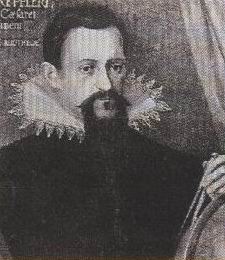|
 In the interplay between quantitative observation and theoretical construction
that characterizes the development of modern science, we have seen that
Brahe
was the master of the first but was deficient in the second.
The next great development in the history of astronomy was the
theoretical intuition of Johannes Kepler (1571-1630), a German who went to
Prague to become Brahe's assistant.
In the interplay between quantitative observation and theoretical construction
that characterizes the development of modern science, we have seen that
Brahe
was the master of the first but was deficient in the second.
The next great development in the history of astronomy was the
theoretical intuition of Johannes Kepler (1571-1630), a German who went to
Prague to become Brahe's assistant.
Brahe's Data and Kepler
Kepler and Brahe did not get along well. Brahe apparently mistrusted Kepler,
fearing that his bright young assistant might eclipse him as the premiere
astonomer of his day. He therefore let Kepler see only part of his voluminous data.
He set Kepler the task of understanding the orbit of the planet Mars, which was
particularly troublesome. It is believed that part of the
motivation for giving the Mars problem to Kepler was that it was difficult, and
Brahe hoped it would occupy Kepler while Brahe worked on his theory of the
Solar System. In a supreme irony, it was precisely the Martian data that
allowed Kepler to formulate the correct laws of planetary motion,
thus eventually achieving a place in the development of astronomy far
surpassing that of Brahe.
References
| 

